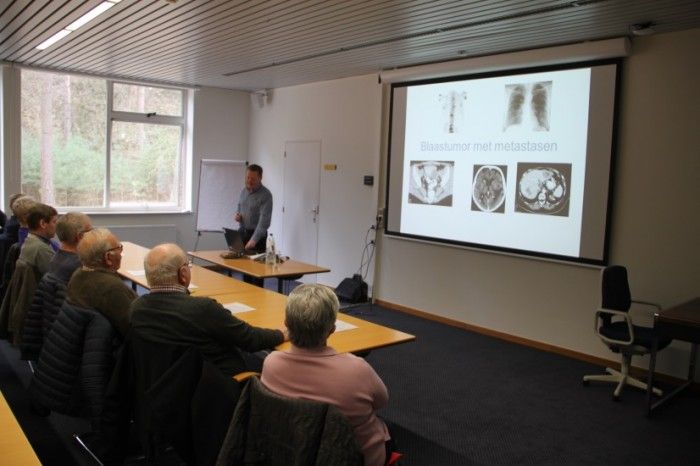In March, VITO PhD student Eline Oeyen organised an information session for people over 60 about current scientific research on the optimisation of the diagnosis and follow-up of bladder cancer at VITO, in collaboration with the University of Antwerp. She invited Dr. Lucien Hoekx, oncology urologist at the University Hospital of Antwerp for a presentation about bladder cancer. During the coffee break, the attendees enjoyed a piece of cake and were invited to donate a urine sample as a healthy check for current scientific research. After this, they made a short tour in the labs at VITO Biology. The attendees liked it very much and found it informative and therefore definitely worth repeating!
Background information
Bladder cancer is the fourth most common cancer in men in the Western world. In Belgium, there are about 2 300 new cases every year. Nevertheless, the diagnosis and monitoring of bladder cancer is still not optimal. Invasive cystoscopic research and urine cytology are used as diagnostic methods. This last method has a very low sensitivity to tumors of a low degree.
Moreover, the risk of relapse is enormous: about 80 % of the diagnosed bladder tumors are non-muscle-invasive and 70 % of these relapses, of which 15 % evolves to a muscle-invasive variant. For these patients, the bladder needs to be removed entirely (cystectomy) resulting in a urostomy. A good long-term monitoring of patients with a non-muscle-invasive tumor is necessary. This and the consecutive treatment of relapse, make bladder cancer the most expensive cancer to treat.
On the one hand, non-invasive, cheaper and more sensitive methods are necessary to diagnose bladder cancer at an early stage, and to avoid cystectomy or death. On the other hand, new methods are also needed to monitor these patients with non-invasive tumors and to detect them as soon as possible in the case of relapse.
To attain these tests, PhD student Eline Oeyen is searching for protein biomarker sets that can detect an initial diagnosis of relapse of bladder cancer. She uses urine, thereby making the test non-invasive. In order to refine the search for potential biomarkers, she uses exosomes that are present in the urine. Exosomes are small extracellular vesicles and are released from normal and tumor cells. They occur in blood and other body fluids, including urine. Urine exosomes are secreted by the epithelia of the entire urogenital tract (prostate, bladder and kidney) and thus offer a detailed view of this epithelium. Exosomes play a role in, among other things, immune regulation and intercellular communication. Recently, there are more and more indications that exosomes are involved in tumor development and the development of metastasis. Exosomes contain a range of different biomolecules such as proteins, microRNAs, mRNA’s and lipids.
Because of their origin, function, molecular content and stability, the exosomes, and more specifically the proteins present in and on the exosomes, have an enormous diagnostic potential for urological diseases.
More information: eline.oeyen@vito.be


